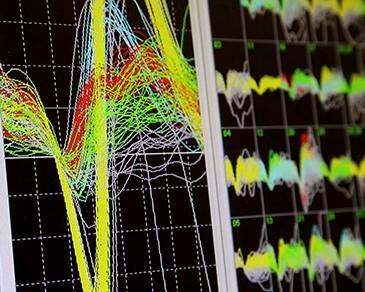
Though their purpose and function are still largely unknown, mirror neurons in the brain are believed by some neuroscientists to be central to how humans relate to each other. Deficiencies in mirror neurons might also play a role in autism and other disorders affecting social skills.
A computer monitor in Duke University lab of Miguel Nicolelis, M.D., Ph.D., displays one monkey’s brain activity. (FILE PHOTO: Shawn Rocco/Duke Health)
Scientists have previously shown that when one animal watches another performing a motor task, such as reaching for food, mirror neurons in the motor cortex of the observer’s brain start firing as though the observer were also reaching for food.
New Duke research published March 29 in the journal Scientific Reports suggests mirroring in monkeys is also influenced by social factors, such as proximity to other animals, social hierarchy and competition for food.
The Duke team found that when pairs of monkeys interacted during a social task, the brains of both animals showed episodes of high synchronization, in which pools of neurons in each animal’s motor cortex tended to fire at the same time. This phenomenon is known as interbrain cortical synchronization.
“We believe our study has the potential to open a complete new field of investigation in modern neuroscience by demonstrating that even the simplest functions of the motor cortex, such as creating body movements, are heavily influenced by the type of social relationships among the animals participating,” said senior author Miguel Nicolelis, M.D., Ph.D.